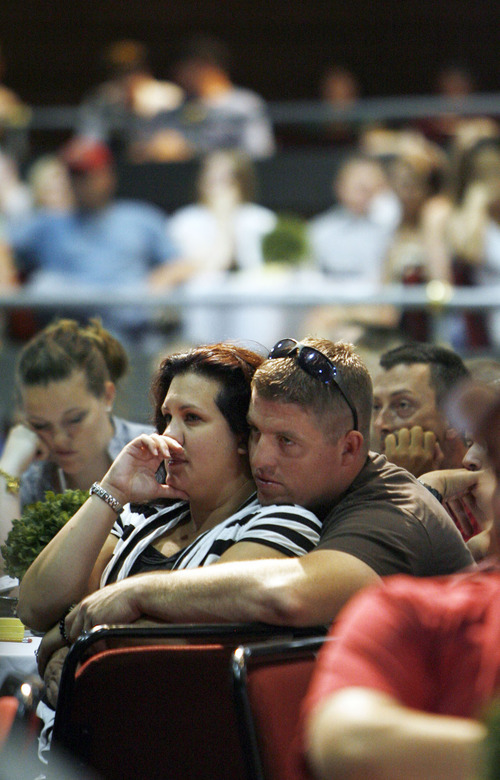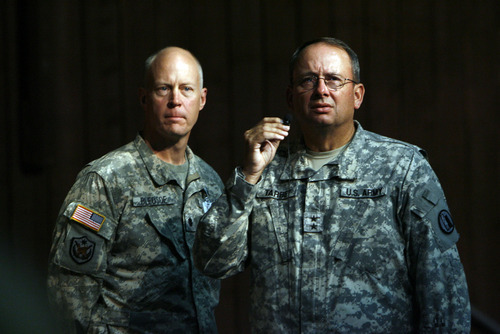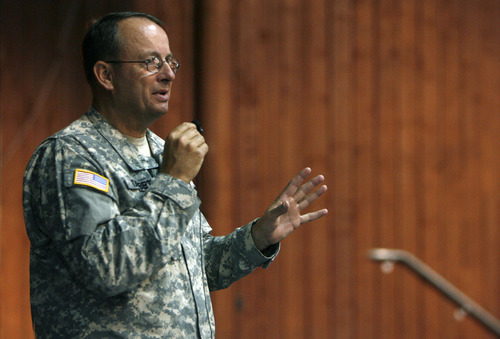This is an archived article that was published on sltrib.com in 2011, and information in the article may be outdated. It is provided only for personal research purposes and may not be reprinted.
Lehi • Noelia Harmon moved her parents from Missouri into her South Jordan home as her husband, a Utah Army National Guard mechanic, geared up for his departure next month to Iraq. For much of this year, Sgt. Randy Harmon and the 400 members of the 211th Aviation unit's First Battalion had been making arrangements for a yearlong absence.
Putting their lives on hold in service of their country, these soldiers left jobs, pulled out of school, rented their homes, froze accounts, canceled health insurance. The hunters among them didn't apply for elk tags.
But on Thursday, word came that deployment was being postponed for a year, throwing some into emotional turmoil.
"I tried to explain it to the kids. They're excited their dad's home but they don't understand," said Harmon, whose four children range in age from 18 months to 12. "We're still trying to feel that one out. You have to come up with a new plan."
Utah's guard commanders met on Saturday with the soldiers and their families, gathered for the weekend at Thanksgiving Point, to explain the situation, provide assistance and ask for understanding. Deployment orders for National Guard units sometimes change, but it is unusual for them to change on such short notice.
This problem may become more pronounced as the U.S. military role winds down in Iraq and Afghanistan.
"You've been 'off-ramped.' Feel good?" asked Maj. Gen.Brian Tarbet, the Utah guard's adjutant general. "It's an untidy process as we draw these forces down."
After nearly a decade of war, military staffing needs have become difficult to predict and subject to negotiations between the U.S. and Iraqi governments.
The 211th is now scheduled to mobilize in October 2012 and depart for Afghanistan the following February. The West Jordan-based battalion supports and serves aboard a fleet of 24 Apache attack helicopters.
"This battalion is a top-notch, high-performing, tight-knit, very professional organization. You guys are ready to go right now. I'm extremely proud," Lt. Col. James Bledsoe told them. "They know how valuable you are to the Army. They don't take these decisions lightly."
Bledsoe and Tarbet promised to make the members' hardships known up the chain of command to the Pentagon and make sure the unit's next deployment won't be jerked around.
"We will be on it like a junkyard dog," Tarbet said. "As your adjutant general, I'll make it my hobby to annoy people in Washington."
The battalion's last deployment was a 2004-05 tour in Afghanistan.
"I was looking forward to going and serving my country, putting my knowledge to use," said Randy Harmon, a 10-year veteran of the group who drives a wrecker that retrieves disabled helicopter-support vehicles. He is one of the 100 members who have jobs with the battalion, so he will not feel any employment repercussions. Battalion Commander Greg Hartvigsen surveyed his troops about the deployment delay, however, and found that one-third are having employment issues.
Some had put off finding a job because they had recently completed training, while others passed up good job offers, said Hartvigsen, a lieutenant colonel. Many left jobs that have since been filled, which transfers the hardship to employers, who are now obligated to take service members back a year earlier than they had planned.
"I'm concerned about our relations with employers. We want employers to hire our guardsmen," Hartvigsen said. "It's not good for our unit, the Utah Guard or the nation as a whole."
Dozens of the soldiers plan to return to college this fall. Utah schools will likely welcome them on campus, where classes resume this week. But getting into classes that will advance them toward their degrees is another matter. Many classes at Utah Valley University and Salt Lake Community College require advance registration.
Mechanic Colby Irons, 22, is a UVU biology major who has completed his general requirements. But he says he will likely switch majors to a health-science field so he'll have better luck finding classes on Monday.
"We're at the mercy of the schools to allow soldiers into those classes," said Capt. Penny Matthews, the Utah guard's education services officer. "Legally, there is nothing we can do to guarantee that you get in the classes you need. The timing is definitely not great, but we are doing everything we can to make sure you get your [federal] tuition assistance."
One soldier, declaring, "I live for two things: hunting and fishing," asked Tarbet if he could ask the Utah governor to allow them to apply late for game tags. When Tarbet asked, "Who else is in this universe?" at least 50 hands shot up.







